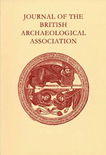
Journal of the British Archaeological Association
Scope & Guideline
Advancing Insights into Archaeological Practices
Introduction
Aims and Scopes
- Interdisciplinary Research in Archaeology and Art History:
The journal publishes research that bridges archaeology with art history, examining how artifacts, architecture, and artistic expressions reflect and influence societal values and practices throughout history. - Focus on Medieval and Early Modern Periods:
A significant portion of the journal's content is dedicated to the study of medieval and early modern history, including architectural developments, artistic movements, and cultural exchanges during these eras. - Material Culture and Heritage Studies:
The journal explores themes of material culture, emphasizing the significance of objects, textiles, and architectural forms in understanding historical narratives and cultural identities. - Regional and Contextual Studies:
The journal encourages studies that focus on specific geographical regions within the British Isles, offering insights into local histories and archaeological findings that enhance the broader understanding of national heritage. - Archaeological Methodologies and Innovations:
The journal highlights advancements in archaeological methodologies, including new technologies and interdisciplinary approaches that contribute to the field's evolution.
Trending and Emerging
- Interdisciplinary Approaches to Material Culture:
There is a growing emphasis on interdisciplinary research that integrates archaeology with art history, anthropology, and cultural studies, reflecting a broader trend towards holistic understandings of historical phenomena. - Sustainability and Environmental Archaeology:
Recent studies are increasingly addressing themes of sustainability and environmental factors in historical contexts, exploring how past societies interacted with their environments and the implications for contemporary sustainability discussions. - Digital Archaeology and Virtual Heritage:
The rise of digital methodologies, including virtual reconstructions and digital archiving, is becoming a more prominent theme, showcasing the journal's commitment to incorporating modern technologies into archaeological research. - Critical Examination of Heritage Practices:
Emerging discussions around the ethics of heritage management and the role of archaeology in contemporary society reflect a growing awareness of the complexities surrounding cultural heritage and identity. - Exploration of Gender and Identity in Archaeology:
There is an increasing interest in examining gender, identity, and social roles within archaeological contexts, indicating a trend towards more inclusive and representative narratives in historical studies.
Declining or Waning
- Classical Antiquity Studies:
There has been a noticeable decline in studies focusing specifically on classical antiquity, as the journal increasingly prioritizes medieval and post-medieval topics, reflecting a broader trend within archaeology. - Traditional Art Historical Focus:
Research that solely emphasizes traditional art historical narratives, without integrating archaeological context, seems to be less frequent in recent issues, suggesting a shift towards more interdisciplinary approaches. - Generalized Archaeological Surveys:
Broad, generalized surveys of archaeological sites or artifacts are appearing less frequently, as the journal favors more focused case studies that provide in-depth analysis and insights into specific contexts. - Narrow Regional Focus:
Papers concentrating on very localized archaeological findings with minimal broader implications are becoming rarer, indicating a preference for studies that connect regional findings to larger historical narratives.
Similar Journals

Journal of Pacific Archaeology
Unlocking the Secrets of Pacific HeritageThe Journal of Pacific Archaeology, published by the New Zealand Archaeological Association, serves as a pivotal platform for disseminating cutting-edge research in the field of archaeology across the Pacific region. With an ISSN of 1179-4704 and an E-ISSN of 1179-4712, the journal provides a forum for scholarly discourse aimed at both established researchers and emerging scholars alike. Focusing on the rich tapestry of archaeological studies, it covers a diverse array of topics, from ancient settlement patterns and cultural practices to contemporary analyses of material culture. As an Open Access journal, it ensures that its findings are readily available to all, fostering inclusivity in academic research and enabling practitioners to share knowledge without barriers. The Journal of Pacific Archaeology is indispensable for those committed to understanding the complexities and nuances of Pacific archaeology, making significant contributions to both regional and global archaeological narratives.
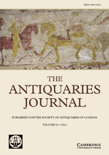
Antiquaries Journal
Exploring the Depths of Antiquity.The Antiquaries Journal, published by Cambridge University Press, is a prestigious publication dedicated to the multidisciplinary exploration of antiquarian studies, archaeology, history, and the visual arts. With an impact factor reflective of its influence within the academic community, it is essential reading for researchers, professionals, and students alike. This journal serves as a vital platform for disseminating cutting-edge research and scholarly discourse, particularly in its recent categorization within Q1 in Visual Arts and Performing Arts and Q2 in History. The journal spans a rich historical timeline from 1921 to the present, offering unique insights and fostering dialogue in the interrelated fields of archaeology and historical inquiry. While it is not an open-access journal, its commitment to rigorous peer review and academic excellence ensures that the content remains a critical resource for anyone engaged in the study of the past, particularly within the United Kingdom and beyond.
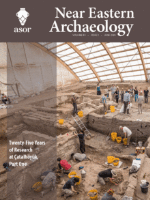
NEAR EASTERN ARCHAEOLOGY
Delving Deep into the Near East's Cultural LegacyNEAR EASTERN ARCHAEOLOGY, published by University of Chicago Press, is a premier journal dedicated to the field of archaeology, particularly focusing on the rich cultural heritage and archaeological findings of the Near East. With an ISSN of 1094-2076 and an E-ISSN of 2325-5404, this esteemed publication provides a vital platform for scholars and practitioners to share their research, insights, and discoveries. The journal holds an impressive ranking in the Q1 quartile for both Archaeology and History in 2023, reflecting its significant impact within these fields and a robust history of scholarly contribution. The journal has been pivotal in shaping discussions around archaeological methodology, theory, and contemporary issues from 2002 to 2024, as it continues to reach a wide audience through various access options. With Scopus rankings placing it in the top percentiles for both History and Archaeology, NEAR EASTERN ARCHAEOLOGY represents an essential resource for researchers, professionals, and students alike, fostering the exploration and understanding of the region's archaeological narrative.

Slovenska Archeologia
Illuminating the past through rigorous scholarship and research.Slovenska Archeologia is a prominent journal published by the Slovak Academy of Sciences, Institute of Archaeology, dedicated to advancing the field of archaeology through rigorous scholarly research and insightful scholarship. With an ISSN of 1335-0102 and an E-ISSN of 2585-9145, this journal has been a vital platform for archaeologists and academics since its inception, converging its insightful publications from the years 2017 to 2023. Awarded a Q2 ranking in the field of archaeology across both arts and humanities categories, it holds a respectable position in the Scopus rankings, recognizing its contributions to the discipline. Based in Slovakia, the journal is an essential resource for professionals, researchers, and students interested in archaeological findings and methodologies. While it does not currently offer Open Access options, its commitment to promoting high-quality research makes it a valuable addition to the academic community.

Conimbriga-Revista de Arqueologia
Advancing Archaeological Knowledge for a Richer TomorrowConimbriga-Revista de Arqueologia is a distinguished open-access journal dedicated to the field of archaeology, published by COIMBRA UNIVERSITY PRESS. Since its inception, the journal has fostered a vibrant intellectual community focused on the exploration and dissemination of archaeological research, particularly emphasizing studies relevant to the rich historical and cultural heritage of Portugal and beyond. With its open access model established in 2014, it has become a vital resource for researchers, professionals, and students to share their findings without access barriers, encouraging collaboration and knowledge exchange. Despite the absence of specific metrics such as the HIndex and Scopus rankings, the journal is recognized for its commitment to high-quality scholarship and its role in advancing archaeological discourse. Positioned within the scholarly landscape, Conimbriga-Revista de Arqueologia serves as a crucial platform for the publication of innovative research, reviews, and critical essays, making it an essential journal for those invested in the archaeological sciences.

Rossiiskaya Arkheologiya
Elevating Archaeological Discourse for Tomorrow's ScholarsRossiiskaya Arkheologiya, published by IZDATELSTVO NAUKA, stands as a leading academic journal in the field of archaeology and history, renowned for its commitment to advancing scholarly discourse and research in these vital humanities disciplines. With an impressive Impact Factor and a distinguished position as a Q1 journal in both archaeology and history for 2023, it ranks among the top tier of academic publications, reinforcing its reputation within the scientific community. The journal features a diverse array of studies focusing on archaeological methodologies, historical analyses, and cultural heritage, fostering collaboration and knowledge exchange among researchers, professionals, and students alike. While access to its rich repository of insights is through a traditional subscription model, the journal’s contribution to the archaeological narrative not only elevates current research practices but also propels future inquiries within the Russian Federation and beyond. Addressing critical questions and dialogues within its scope from 2017 to 2023, Rossiiskaya Arkheologiya serves as an essential resource for anyone dedicated to exploring the complexities of human history through material culture.

Archeologicke Rozhledy
Connecting disciplines, enriching archaeology.Archeologicke Rozhledy, published by the Academy of Sciences of the Czech Republic, Institute of Archaeology, is a pivotal open-access journal dedicated to advancing the field of archaeology. Since transitioning to open access in 2019, it has made significant strides in disseminating high-quality research, serving as a vital resource for researchers, professionals, and students alike. With an ISSN of 0323-1267, the journal has gained recognition for its contributions in the domains of arts and humanities, particularly archaeology, as evidenced by its 2023 Q2 ranking in both categories. Operating out of the historical city of Prague, the journal encompasses a broad scope of archaeological scholarship, reflecting a commitment to interdisciplinary approaches and fostering dialogue within the global archaeological community. With its notable Scopus rankings—#115/413 in Arts and Humanities and #113/354 in Social Sciences—Archeologicke Rozhledy stands as a crucial outlet for innovative research and scholarly exchange.
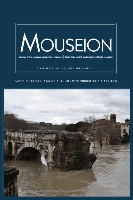
Mouseion-Journal of the Classical Association of Canada
Uncovering the past, enriching the present.Mouseion - Journal of the Classical Association of Canada, published by University of Toronto Press Inc, stands as a vital academic resource in the fields of Classics and Archaeology. With a focus on promoting scholarly discourse, this journal provides a platform for original research, critical reviews, and interdisciplinary studies that engage with ancient cultures and their legacies. Since its convergence in 2019, Mouseion has quickly established itself within the academic community, achieving a commendable Q1 ranking in Classics and Q2 in both Archaeology categories in 2023, showcasing its commitment to excellence. While not an open-access journal, it is positioned among the top 29% of classics journals, reflecting its impact and the quality of publications. Nestled within Canada, this journal addresses a global audience of researchers, professionals, and students dedicated to the exploration of the classical world, and it endeavors to contribute significantly to the scholarly understanding of cultural heritage.

Studijne Zvesti Archeologickeho Ustavu Slovenskej Akademie Vied
Exploring Slovakia's rich heritage through scholarly research.Studijne Zvesti Archeologickeho Ustavu Slovenskej Akademie Vied is a leading journal in the field of archaeology, published by the SLOVENSKA AKAD VIED, ARCHEOLOGICKY USTAV, based in Nitra, Slovakia. This esteemed journal, with the ISSN 0560-2793, has established itself as a vital resource for scholars and researchers, reflecting significant academic contributions in both the arts and humanities as well as social sciences. With a 2023 Scopus ranking placing it in the second quartile (Q2) for archaeology, it showcases rigorous research and innovative methodologies, essential for advancing archaeological studies. While it is not an Open Access journal, it continues to offer valuable insights into archaeological findings, theoretical frameworks, and interdisciplinary approaches. The journal serves as a bridge, connecting local Slovak archaeology with international discourse, making it an indispensable tool for students, professionals, and academics striving for a deeper understanding of the archaeological heritage of Slovakia and beyond.
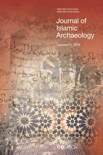
Journal of Islamic Archaeology
Engaging Minds in Islamic Archaeological ResearchJournal of Islamic Archaeology is a distinguished publication dedicated to advancing the field of archaeology through the lens of Islamic heritage and culture. Published by EQUINOX PUBLISHING LTD, this journal provides a platform for researchers, professionals, and students to disseminate their findings and engage in critical dialogue regarding the archaeological aspects of Islamic societies from 2014 to the present. With an ISSN of 2051-9710 and E-ISSN 2051-9729, the journal is indexed within significant academic databases and positioned notably in the Q3 and Q2 quartiles for archaeology in the Arts and Humanities and Social Sciences categories, respectively. The journal fosters scholarly exchange and innovation, drawing attention to the rich tapestry of Islamic archaeology, and securing its role as an essential resource for practitioners and academics alike. Its commitment to rigorous peer-review and high-quality contributions ensures a valuable repository of knowledge, enhancing the understanding of an often underrepresented field in archaeology.